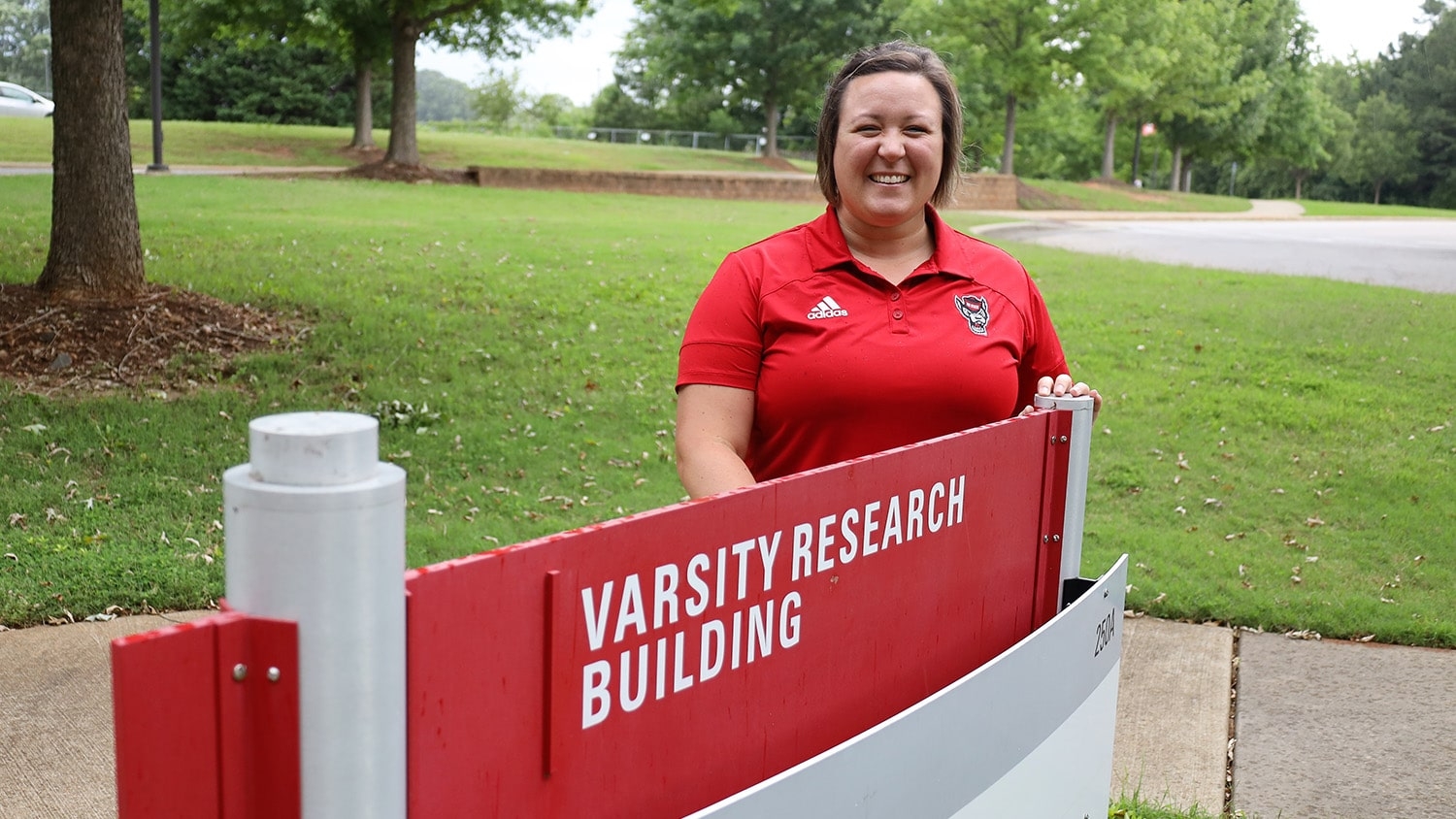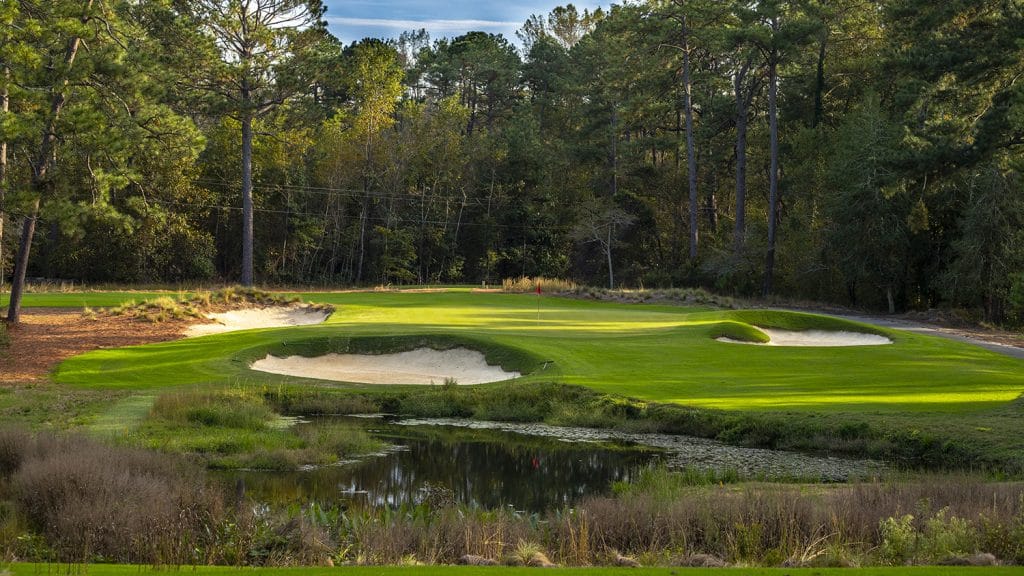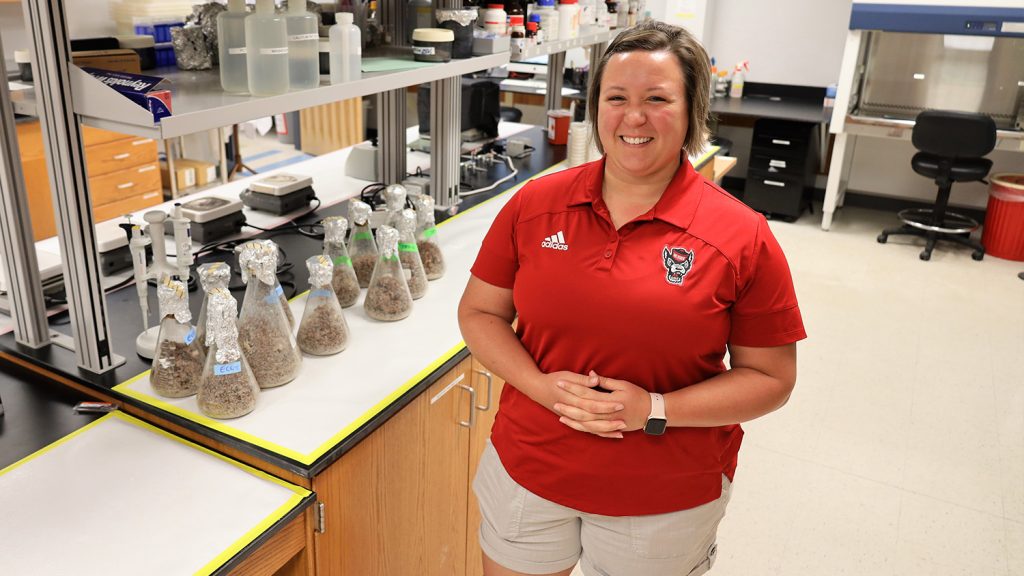Grad Student on Home Turf as Volunteer at U.S. Women’s Open
Brandi Merrick volunteers as a greens mower at the 77th U.S. Women’s Open golf tournament at Pine Needles Lodge & Golf Club in Moore County this week. It's a chance to follow her twin passions: turfgrass and golf.

Brandi Merrick, a graduate research assistant in NC State’s plant pathology program, loved growing grass before she loved playing golf.
Now, the graduate of Iowa State with a degree in agriculture education and former high school math, science and agriculture teacher can’t imagine her life without either, something she will think about often this week as she volunteers as a greens mower at the 77th U.S. Women’s Open golf tournament at Southern Pines’ Pine Needles Lodge & Golf Club.
The seven-day service opportunity, which began earlier this week, will not only include prepping the famed Donald Ross-designed course for the best women’s golfers in the world, but also will give Merrick and other female members of the Golf Course Superintendents Association of America (GCSAA) the opportunity to participate in workshops for women in the industry. It’s the second year in a row that Merrick will volunteer at the United States Golf Association’s national championship for women’s golf, which began with four practice days on Sunday and will continue with four competition days beginning Thursday.
In all, there are 31 women from golf courses and the sports turf industry volunteering in agronomy services at the Open, some of whom are members of the CGSAA. They join 40 other volunteers and the 17 members of Pine Needles’ fulltime agronomy team in preparing the course for the 156-player field that is chasing a $10 million purse, one of the largest payouts in women’s professional sports. Merrick has been a member of the 19,000-person organization — only 2% of which are women — since she first became interested in agronomy more than 10 years ago.

Last year, at San Francisco’s Olympic Club, she spent the week cutting holes on the course’s famously tricky greens.
Her task this year as a greens mower will be significantly different than her first Open. The day begins with a 3:45 a.m. wakeup call, a 4 a.m. daily briefing, followed by mowing three different greens with a partner, long before the first golfers begin daily play. One will use a self-propelled mower with rollers to cut the greens and the other will place a turning board on the edge of the green that allows the mower to change direction without damaging the grass on the green’s apron. She and a partner will mow three greens before sunrise, then again as the sun goes down following each day’s play.
In between on the weekdays, the GCSAA will conduct training seminars, professional development sessions and networking opportunities for the female volunteers.
“Last year, we had a seminar where we talked about what it was like to be a woman in a male-dominated field,” Merrick says. “Everyone shared their story. My history is a little different than most because I have nothing but wonderful experiences, though I realize others have had a more difficult time being accepted in this industry.”
Hallowed Ground
Like many Moore County courses, Pine Needles is hallowed ground for golfers. Built in 1928 by famed designer Donald Ross and purchased in 1954 by couple Peggy Kirk and Warren “Bullet” Bell, the course was a leader in women’s golf education long before it ever hosted its first Open in 1996. This year’s Open will be the fourth conducted at Pine Needles, the most in the history of an event that began in 1946.
Merrick had no idea that taking an upper-level turf class as a horticulture requirement for her college degree would set her on a path to plant pathology or a future in the golf industry.

“The turf class was the only one that fit my schedule and everybody told me I was going to hate it,” she says. “I showed up and I loved it all from the first minute I stepped in class. I loved the topic. I loved my professor. I loved my classmates. I loved everything about it.”
Little did she know that there were golf courses and resorts and other professional opportunities that employed turf experts as superintendents. She applied for internships all over the country, hoping to find one that would get her away from Iowa’s merciless cold winters.
“I said I would take the first internship that was somewhere warm,” Merrick says. “I didn’t know what Pinehurst was, but I knew North Carolina is warm.”
At Home in North Carolina
At the time, she didn’t even enjoy playing golf, but learned to love the game during her summer internship at the resort’s course No. 5. And, after working at resorts in Pinehurst and Asheville, and marrying a North Carolina native, she’s pretty much set on staying in the Old North State, where golf creates $2.3 billion in direct spending and collectively pays its 53,000-person workforce more than $1.3 billion.
After teaching at both high schools and middle schools in the state, Merrick eventually decided to pursue a degree in NC State’s turf pathology program, working on three different golf-related research projects. Two of those projects study take-all root rot in ultra-dwarf bermudagrass and another surveys and takes samples from more than 50 golf courses in the state about their bermudagrass greens.
When she finishes her degree, Merrick is considering going into an academic research field or maybe even pursuing a superintendent’s job at a golf community or resort. For now, she’s adding to her resume by working at the biggest women’s golf event in the country.
“The opportunity to volunteer at the Open,” Merrick says.” It doesn’t get any bigger than that.”
This post was originally published in NC State News.
- Categories:


